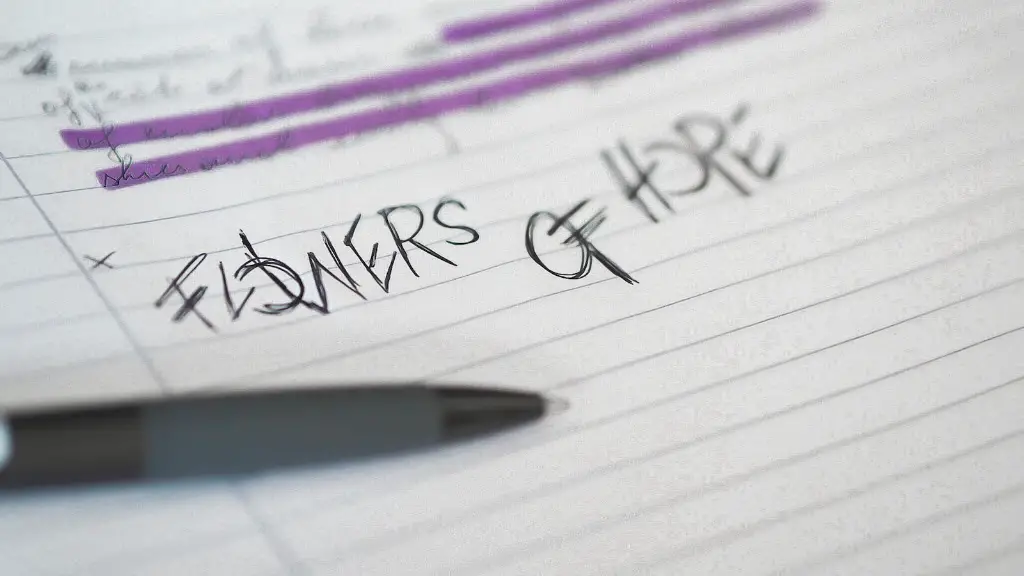Studying poetry as an art form offers a range of benefits to students and professionals looking to increase their understanding of how to create and express themselves through language. Poetry is an art form of creative expression, designed to evoke emotion, generate thought and express ideas. This form of written expression is highly subjective and creative, which gives the poet a wide variety of potential uses for their art. As such, the study of poetry is an important part of any humanities program and is known by a variety of different names.
The study of poetry is most commonly referred to as literary studies. This encompasses the close analysis and interpretation of poetry, as well as related areas like song lyrics and spoken word performances. Literary studies involve looking at a text’s structure and meaning, in order to understand how the poet has used language and rhythm to create a certain effect. In addition to studying the literature itself, literary studies involve exploration of the cultural contexts, social messages and underlying symbolism of poetic works.
Another term associated with the study of poetry is poetics. This is a more theoretical discipline, focusing on the structures, conventions and dynamics of poetic language. Poetics involves the exploration of what makes a particular poem successful, as well as how it functions as a creative work of art. This can involve exploring poetic form, prosody, versification and the use of figurative language, in order to gain a greater understanding of how poets create and convey their ideas.
The use of poetic devices, such as metaphor, simile and alliteration, are also important components of poetics. Poets often use familiar images and concepts to convey universal experiences and emotions. The study of poetics provides an excellent opportunity to explore how language can be used to create powerful effects, as well as to learn more about the poetry of different eras and cultures.
Related to poetics is aesthetics, which focuses on the philosophy, beauty and meaning within poetry. Aesthetics looks at how art, literature and music all affect our emotions and our perception of beauty. Aesthetics in poetry explores the power of language and how it can evoke feelings of deep emotion in the reader. By studying aesthetics, students are able to gain an appreciation for not only the creative and lyrical nature of poetry, but how poets also use their work to make statements about the human condition and the beauty of life.
Ultimately, the goal of the study of poetry is to become a better poet. By understanding poetry at a theoretical level, as well as having an appreciation for the cultural, historical and social aspects of the genre, poets of any level can improve the quality of their work. In addition to studying poetry as an art form, it is also useful to practice writing and to read poetry of different styles on a regular basis, in order to gain a better understanding of the craft.
History and Context
Most disciplines associated with the study of poetry have their origins in classical Greece, such as poetics and literary studies. Poets from this era developed the conventions which form the core of poetic writing today, such as lyricism and irony. Over the centuries, these conventions were modified and adapted to the cultural contexts of different eras, resulting in a wide variety of styles of poetry.
In modern times, the study of poetry has evolved to incorporate a range of critical methods and approaches, as well as a greater appreciation for the cultural, political and social aspects of the genre. scholarly journals, especially those related to humanities disciplines, are a great starting point for exploring recent theories and approaches to the study of poetry. It is also useful to explore the work of contemporary poets, who often question conventions and offer new and innovative interpretations of the genre.
The Practical Benefits
Studying poetry offers a range of practical benefits, both in terms of creating and reading literary works. An in-depth knowledge of the conventions and techniques of the genre enables poets to craft their work with a greater level of skill and creativity. The study of poetic history and context also offers an insight into the formation of poetic trends and the impact of different historical and cultural factors on the genre.
For readers, poetry is an opportunity to explore ideas and feelings in a creative and imaginative way. It provides an opportunity to gain a greater appreciation for language and its potential for conveying complex ideas and emotions. Studying poetry also enables readers to engage with literature from different contexts, which can aid in developing a well-rounded understanding of literature and culture.
Conclusion
The study of poetry is an important part of any humanities program and provides a wealth of insights into language, culture, history and society. Scholars often refer to the study of poetry as literary studies, poetics or aesthetics, each involving a different approach and focus. By understanding the techniques associated with the genre, poets and readers can portray and gain a greater appreciation for how language is used to create powerful works of art.


